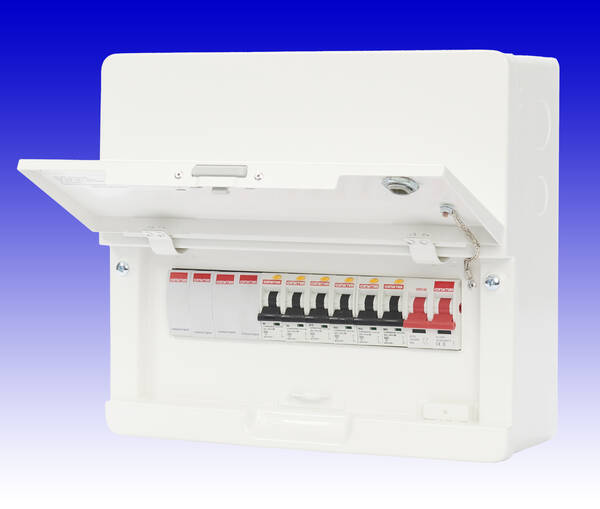Top Functions to Search For in High-Quality RCBO CONSUMER UNITS
Top Functions to Search For in High-Quality RCBO CONSUMER UNITS
Blog Article
The Function of Customer Devices in Effective Energy Monitoring Equipment
Consumer systems are indispensable to efficient energy management systems, offering as the key circulation factors for electric power within structures. The introduction of smart technologies has actually even more boosted their functionality, permitting for real-time data tracking and nuanced power consumption analysis.
Recognizing Consumer Devices

Recognizing the duty of consumer devices starts with acknowledging their necessary function in protecting electrical systems. By separating faults within certain circuits, consumer systems stop extensive blackouts and potential fire hazards. This seclusion is accomplished through using breaker that trip or integrates that blow when a mistake is discovered, therefore reducing off the electric flow to the impacted circuit.
Furthermore, customer systems facilitate the organized distribution of power, improving the effectiveness of power use. They enable the methodical administration of electric tons, which can be specifically essential in industrial and commercial settings where need can rise and fall considerably. Properly conserved consumer devices add to the durability of electric systems and aid in minimizing downtime brought on by electric failures, inevitably supporting the seamless procedure of energy-dependent centers.
Smart Technologies Integration

A vital advantage of wise customer systems is their capacity to utilize advanced formulas and artificial intelligence for predictive analytics. This enables preemptive modifications based upon usage patterns, weather prediction, and other variables, dramatically enhancing total effectiveness. Furthermore, smart customer units facilitate demand response programs, where energy use can be dynamically adjusted throughout optimal periods to stabilize the grid and reduce expenses.
The assimilation of renewable resource sources, such as solar and wind, is also streamlined through wise customer systems. By intelligently managing the intermittency of these resources, these devices ensure a balanced and dependable energy supply. Furthermore, smart customer systems enhance individual interaction by giving in-depth understandings and remote capacities through mobile applications, promoting a much more positive approach to power preservation and sustainability.
Tracking Power Usage
Building on the abilities of clever technologies assimilation, checking power usage becomes a crucial focus within power monitoring systems. Efficient monitoring works as the structure for determining power ineffectiveness and executing corrective actions. By leveraging innovative metering facilities (AMI), real-time information on power usage can be collected at granular degrees, supplying valuable understandings right into consumption patterns and peak need periods. This data-centric approach enables both consumers and energy managers to make informed choices focused on lowering waste and improving overall performance.
Smart meters and Internet of Points (IoT) gadgets play a pivotal role in this monitoring procedure. These devices can track energy usage in real-time, transferring data to central systems for analysis.
The integration of these technologies not only empowers customers with detailed details regarding their power use however additionally sustains energy companies in taking care of lots circulation better. Ultimately, exact and constant surveillance is indispensable for accomplishing energy effectiveness, cost savings, and sustainability goals within energy administration systems.
Optimizing Appliance Usage

One reliable approach includes determining height and off-peak hours to move energy-intensive activities, such as laundry or dishwashing, to times when power need is reduced. This not just lessens pressure on the grid however additionally profits from lower energy tariffs. Furthermore, integrating artificial intelligence formulas permits for anticipating upkeep, ensuring appliances run at optimum effectiveness and lengthening their lifespan.
Energy administration systems can likewise incorporate user-specific preferences and actions to customize device use schedules. As an example, smart illumination systems can adjust illumination based on occupancy and all-natural light accessibility, while HVAC systems can keep comfort degrees without excessive power use.
Encouraging Sustainability
Promoting sustainability within power management systems entails not just improving effectiveness however also promoting eco responsible techniques. Consumer systems are integral to this process, as they give real-time data and control systems that enable individuals to keep track of and lower their power consumption. By leveraging sophisticated modern technologies, consumer units can determine energy-saving possibilities and help with the combination of renewable resource sources like solar and wind power.
One vital aspect of advertising sustainability is informing customers on the advantages of accountable power use. Through comprehensive understandings offered by customer systems, users can make educated choices that lessen their carbon impact. For circumstances, these devices can advise optimum times for running high-energy devices based upon grid demand company website and renewable energy accessibility, therefore decreasing dependence on fossil gas.
Moreover, consumer units support the adoption of wise grid innovations, which enhance the total efficiency and reliability of power circulation. By enabling two-way communication in between customers and energy service providers, these systems can dynamically readjust to energy needs, decreasing waste and advertising making use of sustainable power practices.
Conclusion
Consumer devices, as important components of power management systems, substantially enhance electric security and efficiency within structures with circuit defense and wise modern technology assimilation. Real-time information tracking and evaluation promoted by these units maximize energy usage and home appliance use. In addition, the incorporation of renewable resource sources advertises lasting techniques, adding to minimized general energy intake and lower carbon footprints. Customer systems linked here play a crucial role in progressing both energy performance and environmental sustainability.
Developments in clever technologies have reinvented the capacities of energy management systems, particularly with the combination of clever customer units.Building on the abilities of clever technologies combination, monitoring energy usage comes to be an important focus within energy monitoring systems.Reliable appliance use optimization is a vital component of power monitoring systems, intending to improve performance and reduce unneeded energy usage.Consumer systems, as indispensable parts of power monitoring systems, significantly enhance electric safety and security and performance within structures with circuit security and smart technology integration. Additionally, the incorporation of eco-friendly power resources promotes sustainable practices, adding to lowered total power usage and lower carbon footprints.
Report this page